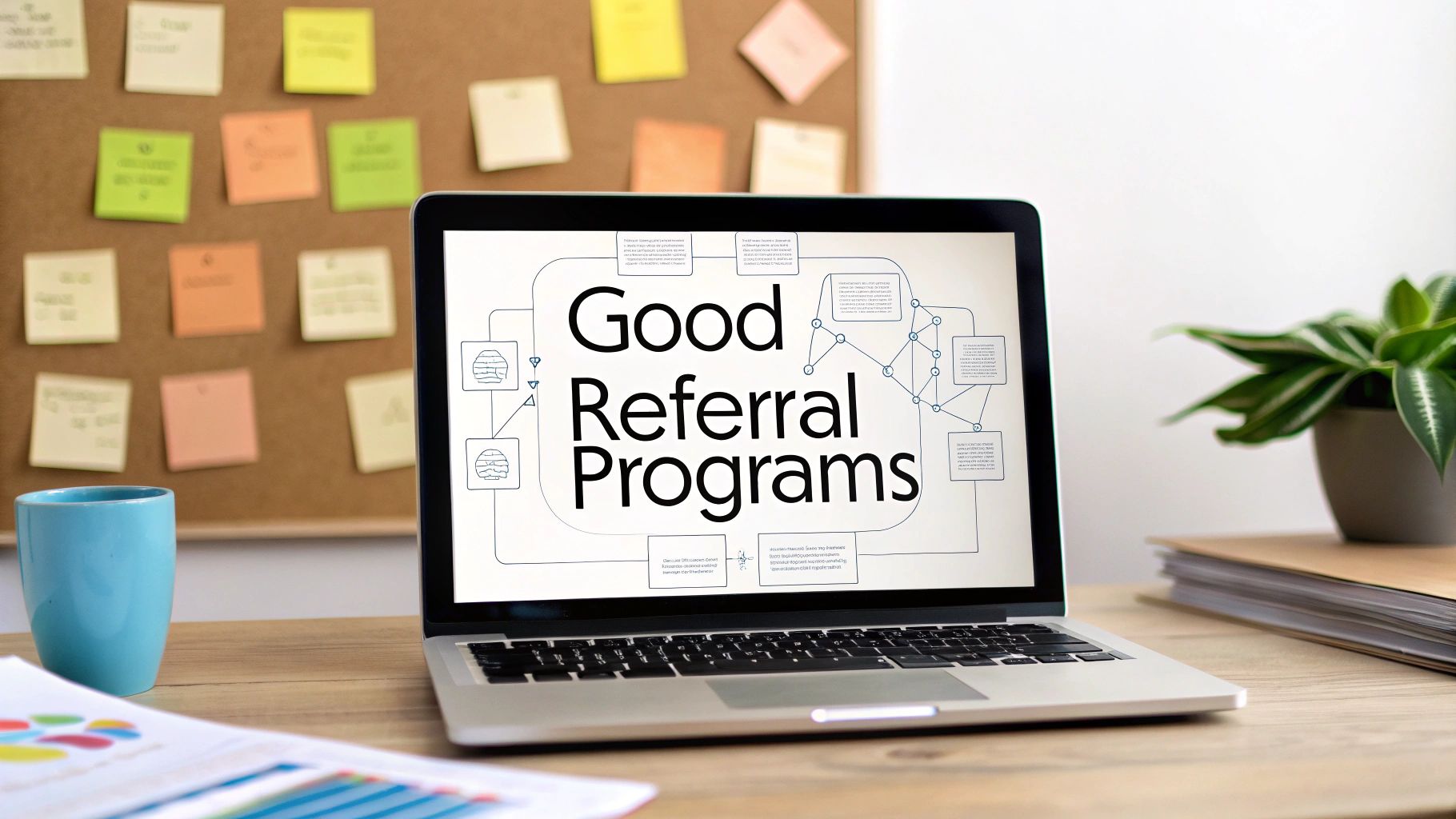Referral marketing promises a powerful, self-sustaining growth engine, yet many programs never gain traction. The difference between viral success and a forgotten feature often comes down to strategy, not just technology. A poorly designed program with friction-filled user flows, uninspiring rewards, or a lack of promotion is doomed from the start. This article moves beyond generic advice to dissect the mechanics of genuinely good referral programs from leading SaaS and tech companies.
We'll uncover the specific reward structures, user experiences, and promotional tactics that turn happy customers into your most effective sales team. To ensure your referral program not only avoids common pitfalls but truly thrives, it's crucial to implement creative incentive marketing strategies that work. This list is your blueprint for building a program that converts.
Instead of just listing platforms, we provide a deep strategic analysis of each one, complete with screenshots and direct links. You'll learn from the best, including ReferralCandy, Referral Rock, and PartnerStack, among others. By the end, you'll have a playbook of replicable strategies to design a referral program that doesn't just exist but actively drives measurable revenue and user acquisition.
1. ReferralCandy
ReferralCandy is a powerhouse in the referral marketing space, specifically engineered for ecommerce brands looking for rapid deployment and scalable growth. It has established itself as one of the best choices for stores on platforms like Shopify, BigCommerce, and WooCommerce due to its incredibly fast setup process. This focus on ease-of-use makes it a strong contender for businesses wanting to launch a program without extensive development resources.
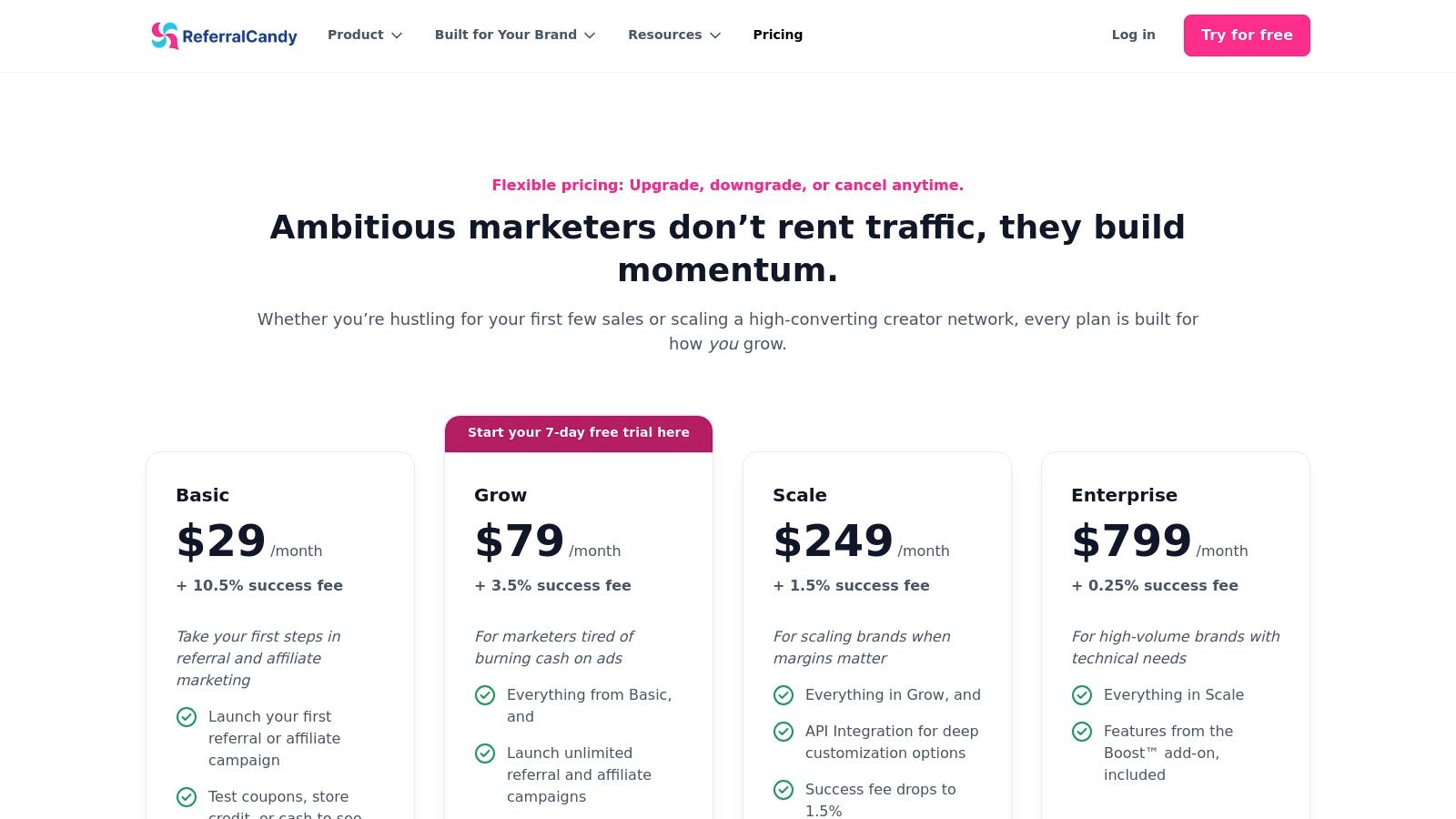
What sets ReferralCandy apart is its pricing model, which aligns costs directly with performance. Instead of a high fixed monthly fee, the platform combines a lower base price with a commission on successful referral sales. This structure makes it one of the more accessible and good referral programs for startups and growing brands to test the waters of referral marketing without a significant upfront investment. For a deeper dive into program structures, you can find a comprehensive guide on building a referral program marketing strategy on Refgrow.com.
Strategic Breakdown
ReferralCandy excels by removing the friction typically associated with launching a referral program. Its deep integrations with platforms like Shopify, Klaviyo, and ReCharge mean you can go live in minutes.
- Primary Strength: Speed to Market. One-click integrations allow for a near-instant setup, letting you capitalize on word-of-mouth immediately.
- Ideal User: Ecommerce brands, particularly on Shopify, that need a reliable, set-it-and-forget-it solution.
- Key Feature: The platform's automated reward payout system handles the logistics of distributing cash, coupons, or store credit, freeing up valuable time for marketing teams.
Pricing Insights
ReferralCandy offers a transparent, tiered pricing model that scales with your success.
| Plan | Base Monthly Fee | Commission | Key Features |
|---|---|---|---|
| Basic | $59/month | 10.5% - 2.5% | Unlimited advocates, core integrations |
| Scale | $239/month | 2.5% - 0.25% | API access, advanced fraud detection |
| Enterprise | Custom | Custom | Dedicated support, custom solutions |
Pros & Cons
- Pros: Extremely user-friendly with a fast learning curve. The cost-effective, performance-based pricing is ideal for early-stage testing.
- Cons: The commission on sales can become costly as your program scales, especially on the Basic plan. Advanced features like API access and tiered rewards are locked behind higher-priced plans.
2. Referral Rock
Referral Rock carves out a unique space in the referral marketing landscape by catering specifically to businesses beyond traditional ecommerce. It's a versatile and flexible platform designed for service-based companies, B2B SaaS, home services, and financial institutions that don't have a standard online checkout process. Its strength lies in managing more complex sales cycles and lead-based referral flows, making it an excellent choice for businesses needing to track referrals from initial contact to a closed deal.
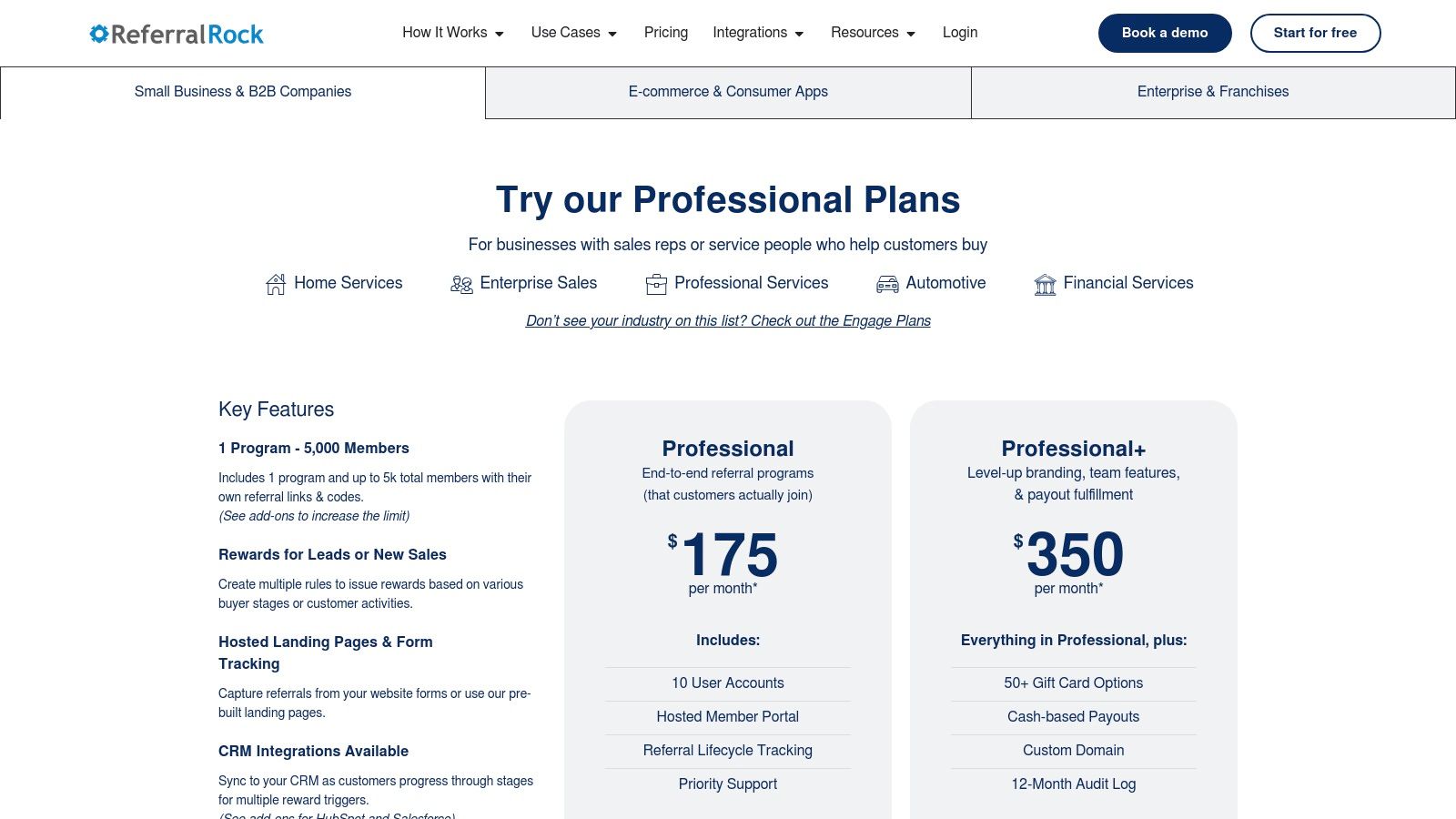
What distinguishes Referral Rock is its flat monthly pricing, which provides predictable costs without commissions or success fees. This model is highly appealing for service businesses with high-value conversions, as they avoid paying a percentage of large contract values. The platform's ability to create dedicated, hosted member portals and landing pages gives businesses a professional, branded hub for their advocates. This focus on non-ecommerce workflows solidifies its position as one of the most adaptable and good referral programs available for service-oriented industries.
Strategic Breakdown
Referral Rock excels by providing the tools needed to manage referral lifecycles in industries where a "sale" isn't a simple online transaction. It empowers businesses to reward advocates at different stages, such as for a qualified lead and again for a closed sale.
- Primary Strength: Flexibility for Service & B2B. Its ability to track multi-stage funnels and integrate with CRMs makes it perfect for businesses with longer sales cycles.
- Ideal User: Service-based businesses, B2B companies, and financial or home service providers that rely on lead generation and offline sales.
- Key Feature: The platform’s robust CRM integrations (HubSpot, Salesforce) and lead form capture capabilities allow businesses to seamlessly insert referral tracking into their existing sales and marketing workflows.
Pricing Insights
Referral Rock uses a straightforward, tiered subscription model based on the number of members in your program.
| Plan | Base Monthly Fee | Included Members | Key Features |
|---|---|---|---|
| Starter | $200/month | 500 members | All core features, standard support |
| Growth | $400/month | 5,000 members | Onboarding support, gift card rewards |
| Established | $800/month | 10,000+ members | Dedicated success manager, CRM add-ons |
Pros & Cons
- Pros: The predictable flat-rate pricing without success fees is a major advantage for high-ticket service businesses. It is purpose-built for non-ecommerce use cases.
- Cons: Additional charges for member overages can lead to unexpected costs if not monitored. Key CRM add-ons required for deeper integration come with an extra fee on top of the base plan.
3. Friendbuy
Friendbuy is an enterprise-grade referral and loyalty platform designed for established brands seeking sophisticated, omnichannel marketing solutions. It powers programs for major US retail companies by offering advanced reward logic and robust support for both online and in-store referral flows. This focus on complex, scalable programs makes it a top choice for businesses aiming to integrate referrals deeply into their core growth strategy.
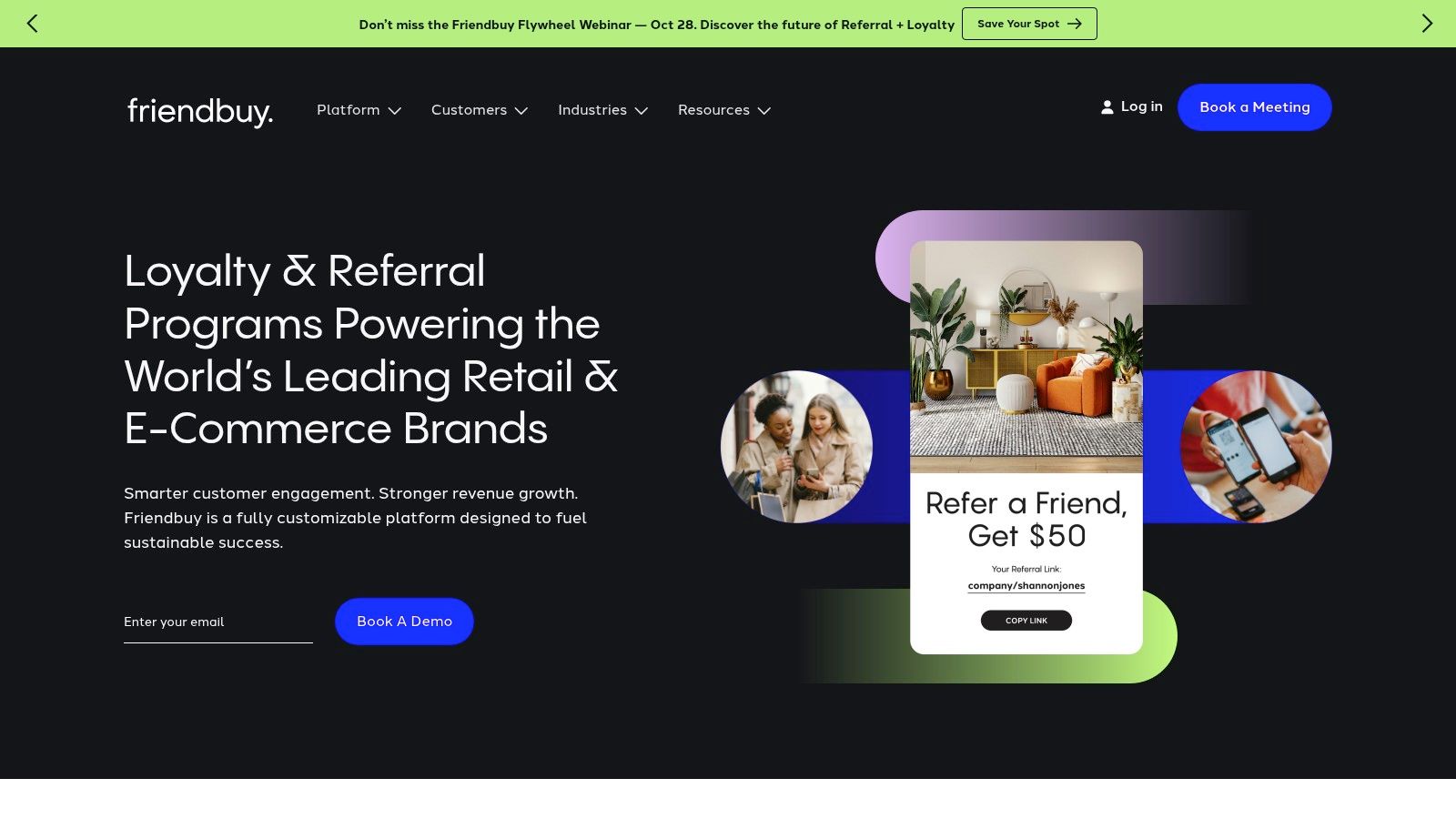
What sets Friendbuy apart is its capacity to handle intricate reward structures, such as tiered rewards or incentives based on specific SKUs. This level of control allows brands to fine-tune their campaigns to maximize customer lifetime value and average order value. As one of the most powerful and good referral programs for mature businesses, its combined loyalty and referral features, including Shopify POS redemption, create a seamless customer experience across all touchpoints.
Strategic Breakdown
Friendbuy excels by empowering brands with deep customization and strategic guidance. It moves beyond simple "give $10, get $10" models to facilitate complex, high-impact campaigns through its extensive documentation and best-practice playbooks.
- Primary Strength: Omnichannel Sophistication. Friendbuy provides the tools to run referral programs that work seamlessly online, in-store, and within subscription models.
- Ideal User: Growth-stage and enterprise-level brands, particularly in retail and direct-to-consumer, that require advanced customization and multi-channel support.
- Key Feature: The platform’s advanced reward engine allows for granular control over incentives, enabling marketers to create highly targeted and effective referral campaigns.
Pricing Insights
Friendbuy's pricing is tailored to enterprise clients and is not publicly listed. Access requires a consultation and sales demo to create a custom package based on specific business needs and scale.
| Plan | Base Monthly Fee | Commission | Key Features |
|---|---|---|---|
| Custom | Varies (Demo Required) | Varies | Advanced reward logic, API access, A/B testing, omnichannel support, dedicated account management |
Pros & Cons
- Pros: Unmatched control over incentive structures for complex product catalogs. Excellent omnichannel capabilities, including Shopify POS integration. Strong thought leadership and implementation guidance provide strategic value.
- Cons: Pricing is not transparent and is geared towards larger budgets, making it less accessible for startups. The platform's complexity may require more dedicated resources to manage effectively.
4. Talkable
Talkable positions itself as a strategic, high-touch referral and loyalty platform designed for enterprise-level ecommerce brands. It moves beyond a purely self-service model, offering managed services and deep strategic support to help large businesses design, launch, and optimize sophisticated word-of-mouth marketing campaigns. This focus on partnership makes it a powerful option for companies seeking more than just software.
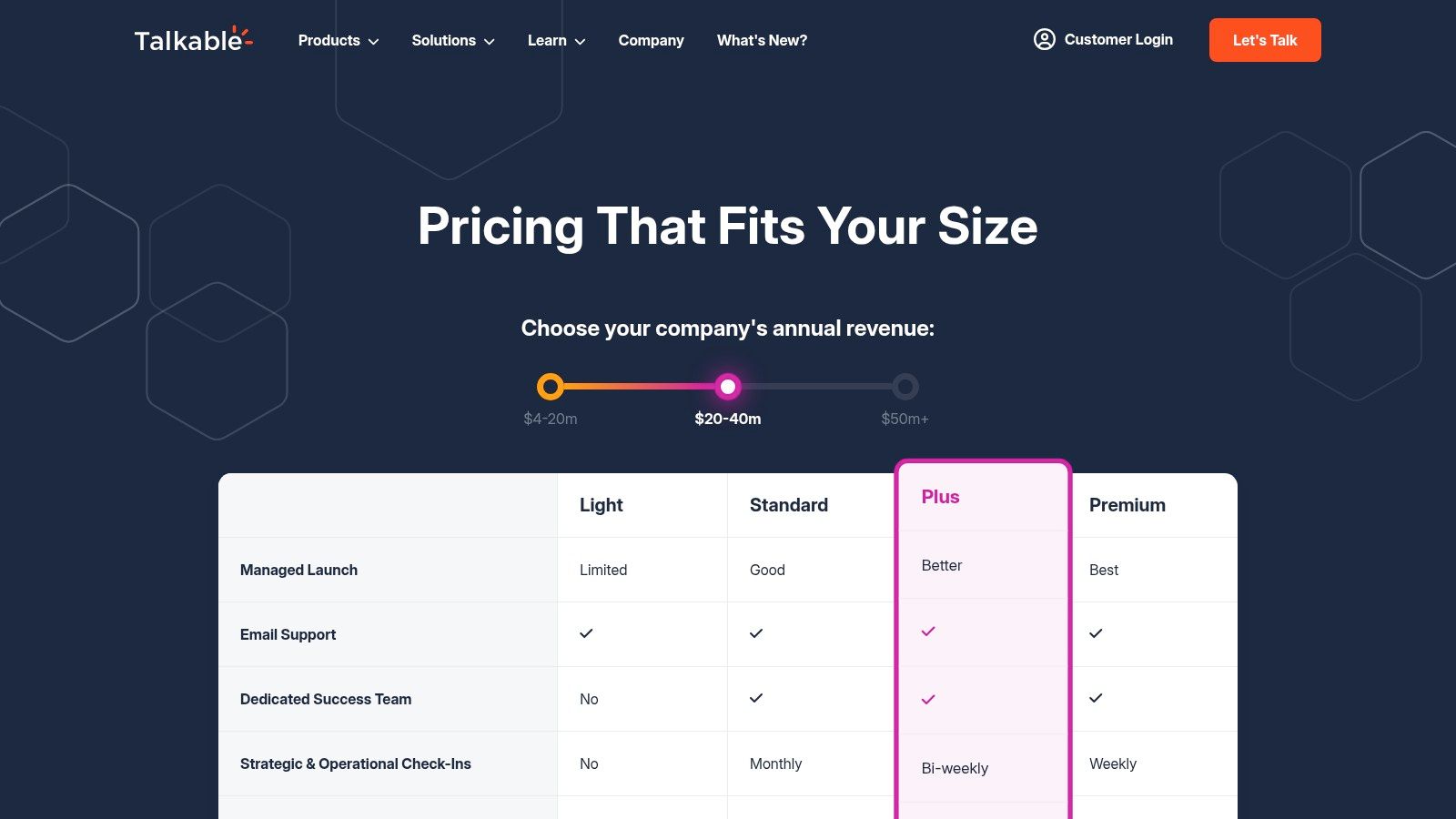
What truly differentiates Talkable is its enterprise-grade toolset, particularly its robust A/B testing engine and advanced fraud prevention. The platform is engineered for brands where performance and security are non-negotiable. Its flat monthly fee structure, which avoids commission-based pricing, is another key selling point for high-volume businesses. This predictable pricing makes Talkable one of the more financially stable and good referral programs for established brands that can project their ROI without worrying about variable costs tied to sales volume.
Strategic Breakdown
Talkable excels by combining a powerful platform with expert strategic guidance, ensuring programs are not just launched but continuously optimized for maximum impact. This hands-on approach is tailored for brands that need to protect their reputation and drive significant revenue through referrals.
- Primary Strength: Strategic Optimization and Fraud Control. Talkable's combination of A/B testing, detailed analytics, and configurable fraud settings allows brands to run secure, high-performance campaigns.
- Ideal User: Large ecommerce brands and enterprise-level retailers that require a managed solution with dedicated support and advanced customization.
- Key Feature: The platform's campaign editor offers deep customization with HTML/CSS access, allowing brands to create a completely on-brand user experience.
Pricing Insights
Talkable utilizes a custom, enterprise-focused pricing model based on flat monthly fees, requiring a consultation for a specific quote. The structure is designed for predictability at scale.
| Plan | Base Monthly Fee | Commission | Key Features |
|---|---|---|---|
| Enterprise | Custom Quote | 0% | Dedicated account manager, A/B testing, advanced fraud control, full design customization |
Pros & Cons
- Pros: Powerful anti-fraud and experimentation features. The flat-fee pricing is cost-effective for high-volume businesses. Strategic services help maximize program ROI.
- Cons: Not suitable for smaller businesses due to enterprise-level pricing and annual commitments. Pricing is not transparent and requires a sales call. An implementation fee is typically required.
5. Tapfiliate
Tapfiliate is a self-service affiliate and referral tracking platform that provides businesses with a powerful, customizable, and predictable way to manage their partnerships. It's particularly well-suited for SaaS and subscription-based companies, offering robust features like recurring and lifetime commission tracking. This focus on subscription models, combined with transparent pricing, makes it a top choice for brands seeking control and scalability without unpredictable costs.
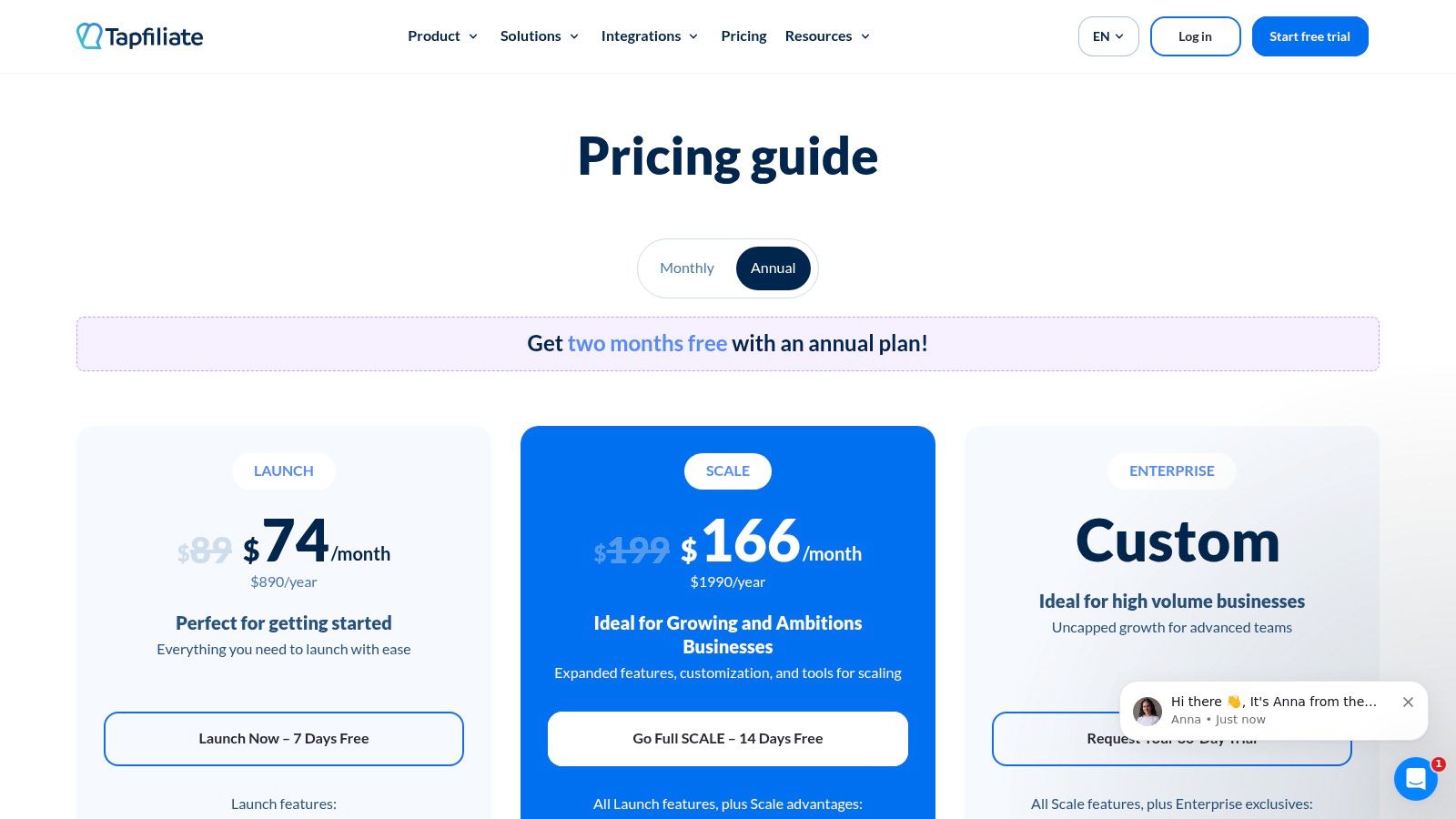
What sets Tapfiliate apart is its blend of accessibility for SMBs and advanced features for scaling businesses, such as white-label branding and custom domain options. The platform avoids transaction fees, meaning your monthly costs are fixed and easy to budget for. This predictability is a key reason why many consider it one of the most good referral programs for long-term growth. For those new to this model, you can learn more about how to start an affiliate program on Refgrow.com.
Strategic Breakdown
Tapfiliate excels by offering deep customization and automation, allowing businesses to create a fully branded affiliate experience that feels like an extension of their own platform. Its support for recurring commissions is a critical advantage for SaaS companies aiming to attract high-value, long-term partners.
- Primary Strength: Subscription Model Support. The ability to automate recurring and lifetime commissions aligns perfectly with the SaaS business model, incentivizing affiliates to refer loyal customers.
- Ideal User: SaaS companies, subscription services, and SMBs that require a white-labeled, highly customizable affiliate and referral solution.
- Key Feature: The platform's 30+ pre-built integrations with services like Stripe, Shopify, and BigCommerce, combined with automated payouts via Trolley, streamline the entire operational workflow.
Pricing Insights
Tapfiliate provides a clear, feature-based pricing structure with a 14-day free trial on all plans.
| Plan | Monthly Fee | Key Features |
|---|---|---|
| Essential | $89/month | Core tracking, 20,000 tracked clicks, 2,000 tracked conversions |
| Pro | $149/month | Custom domain, bonus incentives, up to 10,000 tracked conversions |
| Enterprise | Custom | Full white-label, SSO, premium support |
Pros & Cons
- Pros: Transparent and predictable pricing with no transaction fees. Excellent features for SaaS, including recurring commissions. White-labeling options create a seamless brand experience.
- Cons: Full white-label capabilities and advanced features like SSO are reserved for the highest-tier Enterprise plan. The MLM features may be overly complex for businesses seeking a simple referral structure.
6. Refersion
Refersion is a comprehensive affiliate marketing and influencer management platform designed for ecommerce businesses, with a strong foothold in the Shopify ecosystem. It provides merchants with the tools to build, manage, and track both traditional affiliate and customer referral programs. The platform is known for its robust tracking capabilities and flexible commission structures, which allow businesses to tailor their programs precisely to their needs.
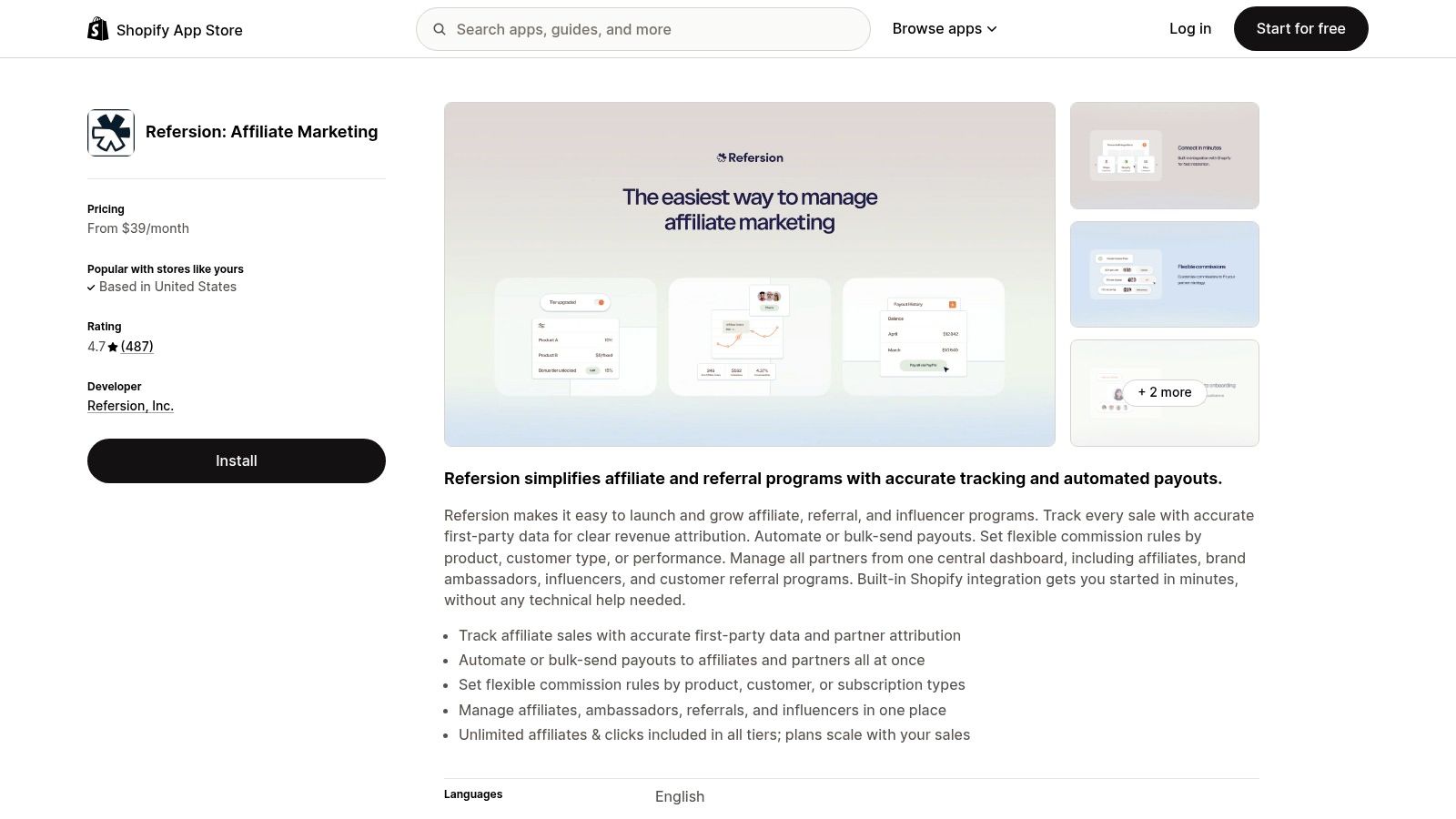
What makes Refersion stand out is its ability to scale alongside a growing business. It bridges the gap between simple referral apps and enterprise-level affiliate networks, offering a clear upgrade path with more advanced features at each tier. This makes it one of the more versatile and good referral programs for merchants who anticipate significant growth and require a platform that can evolve with them without needing a complete overhaul.
Strategic Breakdown
Refersion excels at giving merchants deep control and visibility over their affiliate and referral performance. Its tracking system, which can be configured with a first-party domain, provides reliable data down to the SKU and email level.
- Primary Strength: Scalability and Flexibility. The platform supports everything from a simple customer referral program to a complex, multi-tiered affiliate network with thousands of partners.
- Ideal User: Shopify and BigCommerce merchants who need a powerful, data-driven solution for managing affiliates, influencers, and brand ambassadors.
- Key Feature: Unlimited affiliates and flexible commission structures, including flat rates, percentages, and SKU-specific rewards, give merchants complete control over their program's economics.
Pricing Insights
Refersion offers several pricing tiers designed to match different stages of business growth.
| Plan | Base Monthly Fee | Commission | Key Features |
|---|---|---|---|
| Professional | $119/month | 1.5% | Unlimited affiliates, up to 100 conversions |
| Business | $299/month | 1.0% | Up to 400 conversions, developer API |
| Enterprise | Custom | 0% | Multi-store support, dedicated manager |
Pros & Cons
- Pros: Extremely easy to install and set up on Shopify, leading to a fast time-to-value. The platform scales effectively from starter businesses to mid-market brands. The Enterprise plan offers a 0% transaction fee, which is a major advantage for high-volume stores.
- Cons: The transaction fees on the lower-tier plans can add up for businesses with high sales volume. Advanced features like API access and multi-store management are locked behind more expensive plans.
7. PartnerStack
PartnerStack is a comprehensive partner ecosystem platform designed specifically for the unique demands of B2B SaaS companies. It moves beyond simple referrals to unify affiliate, reseller, and traditional referral programs under a single, powerful dashboard. This integrated approach makes it a go-to choice for businesses aiming to build and scale multi-channel partner strategies without juggling multiple disjointed systems.
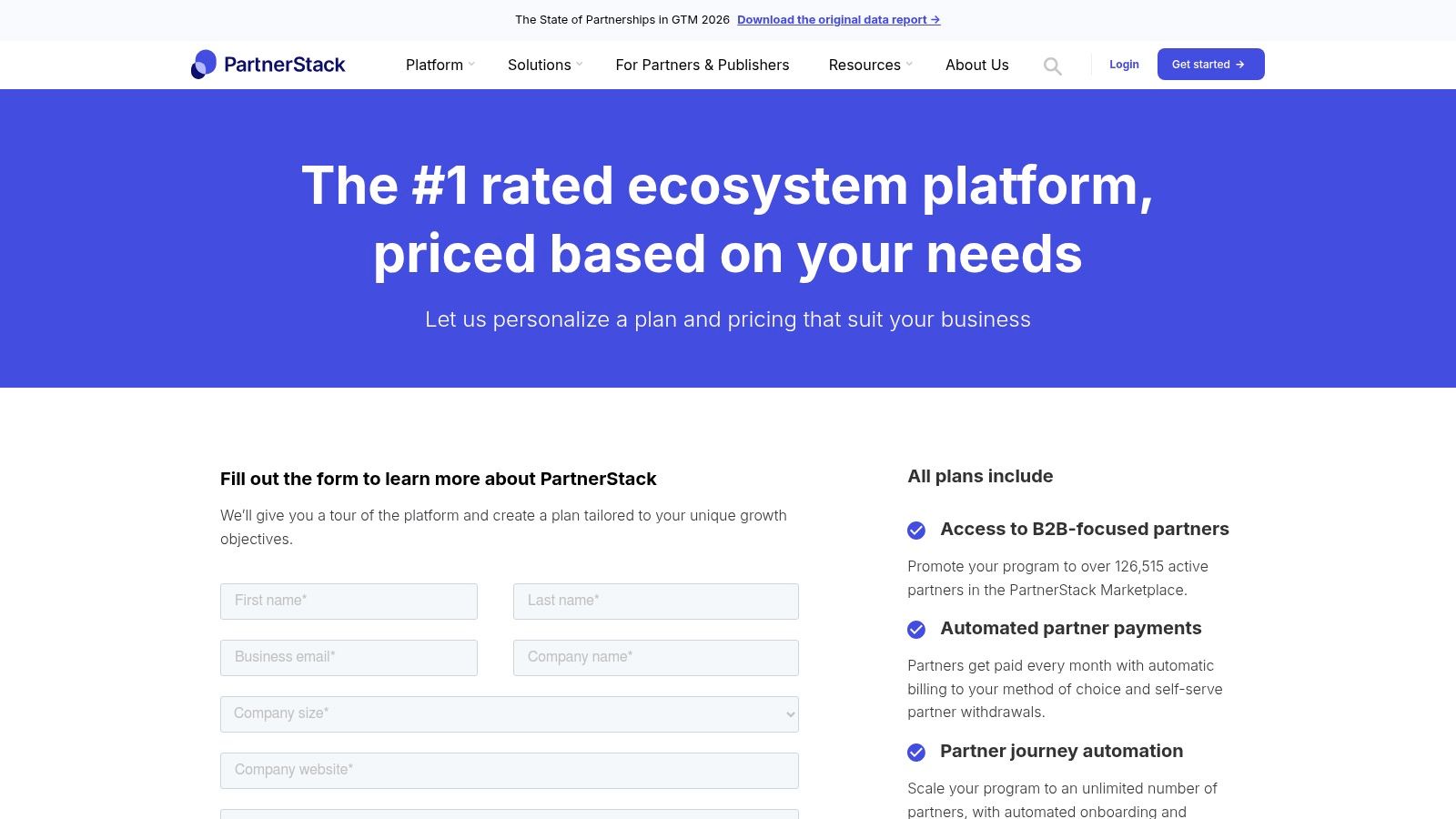
What truly distinguishes PartnerStack is its built-in marketplace of over 116,000 active partners. This feature transforms the platform from a simple management tool into a powerful partner recruitment engine, connecting companies with established affiliates and resellers eager to promote new SaaS products. This network effect provides a significant advantage, making it one of the most effective and good referral programs for B2B tech companies focused on rapid growth. For more details on the technical side of partner management, a guide to referral program tracking can offer valuable insights.
Strategic Breakdown
PartnerStack's power lies in its ability to centralize and automate complex B2B partner operations, from recruitment to payouts. Its structure is engineered to support the entire partner lifecycle, which is crucial for building lasting, revenue-generating relationships.
- Primary Strength: Ecosystem Management. The platform's ability to manage diverse partner types (referral, affiliate, reseller) in one place is its core advantage.
- Ideal User: B2B SaaS companies, especially those in the US market, looking to build a multi-faceted partner program and tap into a ready-made network of promoters.
- Key Feature: The automated monthly payout system simplifies a major operational hurdle, handling global payments to all partners and ensuring compliance, which frees up finance teams from a significant administrative burden.
Pricing Insights
PartnerStack utilizes a custom pricing model tailored to the specific needs and scale of each business. Access to pricing requires a sales demonstration.
| Plan | Base Monthly Fee | Commission | Key Features |
|---|---|---|---|
| Growth | Custom | Custom | Marketplace access, core integrations |
| Enterprise | Custom | Custom | Advanced automation, dedicated manager |
| Partnership OS | Custom | Custom | Fully white-labeled, custom solutions |
Pros & Cons
- Pros: Purpose-built for the complexities of B2B SaaS growth. The large partner marketplace dramatically accelerates partner sourcing and recruitment. Centralized payouts simplify financial operations at scale.
- Cons: Pricing is not transparent and requires a sales demo. The platform's extensive feature set may be overly complex and costly for businesses running a simple, single-channel referral program.
Top 7 Referral Program Platforms Compared
| Platform | 🔄 Implementation Complexity | 💡 Resource Requirements | 📊 Expected Outcomes | 💡 Ideal Use Cases | ⭐ Key Advantages |
|---|---|---|---|---|---|
| ReferralCandy | Low - Quick setup with Shopify & common carts | Moderate - Scaling costs based on referral sales | Effective for early growth & testing | Ecommerce brands on Shopify & similar carts | Fast launch, cost-effective early testing, clear pricing |
| Referral Rock | Moderate - CRM integrations and portal setup | Moderate - Flat monthly fee, some extra for CRM add-ons | Strong lifecycle tracking & lead rewards | Service, B2B, and ecommerce | Flat pricing, service-friendly, onboarding support |
| Friendbuy | High - Enterprise grade with advanced logic | High - Requires enterprise-level resources | High impact with omnichannel loyalty & referral | Growth-stage and enterprise ecommerce | Deep control, omnichannel support, best-practice guides |
| Talkable | High - Managed service with customization | High - Requires annual commitment & fees | Strong anti-fraud and A/B testing effects | Large ecommerce brands needing support | Fraud control, strategic services, testing features |
| Tapfiliate | Low - Self-service with many prebuilt integrations | Low-Moderate - Transparent pricing, no transaction fees | Predictable recurring commissions | SMBs, SaaS, subscription businesses | Transparent pricing, white-label, scalable affiliate management |
| Refersion | Low - Easy Shopify setup, flexible commission | Moderate - Tiered pricing with some success fees | Scales well with affiliate growth | Shopify merchants from starter to mid-market | Unlimited affiliates, easy payouts, 0% fees on top tier |
| PartnerStack | High - Complex B2B partner program management | High - Enterprise features and custom pricing | Large-scale partner ecosystem growth | B2B SaaS companies building partner ecosystems | Large marketplace, multi-program support, centralized payouts |
The Blueprint for Your Own High-Growth Referral Program
Throughout this deep dive into the industry's best referral marketing platforms, a clear pattern emerges. The most successful and good referral programs are not just afterthoughts; they are meticulously crafted growth engines deeply embedded within the product experience. They move beyond clunky, external dashboards and instead offer a seamless, branded experience that feels like a natural extension of the core product.
We've analyzed giants like ReferralCandy and PartnerStack, and the core lesson is consistent: success lies in the details. It's about making advocacy effortless for your users and transparent for your partners. The programs that win are the ones that prioritize a frictionless user experience, present clear and compelling incentives, and integrate flawlessly into the existing customer journey.
Turning Insights into Action
Building your own program can seem daunting, but the path is clearer when you break it down. Start by defining what a successful referral means for your business. Is it a signed-up user, a paid subscriber, or something else entirely? Your answer will shape the entire structure of your program.
From there, consider these critical factors:
- Incentive Structure: What truly motivates your user base? Double-sided rewards, where both the referrer and the new customer benefit, often create the most momentum. Test different reward types like cash payouts, account credits, or feature upgrades to find what resonates.
- User Experience (UX): How easy is it for a happy customer to share your product? The process should be intuitive, with unique referral links readily available and sharing options built directly into their workflow. A confusing or multi-step process is the fastest way to kill participation.
- Brand Consistency: Your referral portal should look and feel like your product. A jarring transition to a third-party-branded page erodes trust and diminishes the user experience. Native integration is no longer a luxury; it's a requirement for modern SaaS.
Choosing the Right Foundation
The tool you choose is the foundation upon which your program is built. For early-stage SaaS startups and product-led teams, the ideal solution is one that champions simplicity and deep integration. You need a system that doesn't require a dedicated engineering team to manage or force your users out of your application.
When building your own, it can be useful to examine various models, such as Octolens' own referral program, to see how these principles are applied in a real-world context. The ultimate goal is to create a self-perpetuating cycle where your best customers become your most effective and authentic marketing channel. By combining the strategic lessons from the examples we've explored with purpose-built technology, you can construct a powerful, scalable referral engine that drives sustainable growth from day one.
Ready to build a referral program that’s fully native to your SaaS product? Refgrow allows you to embed a complete affiliate portal with just a single line of code, creating a seamless experience your users will love. Stop sending customers to external dashboards and start building a powerful, in-app growth engine today with Refgrow.
